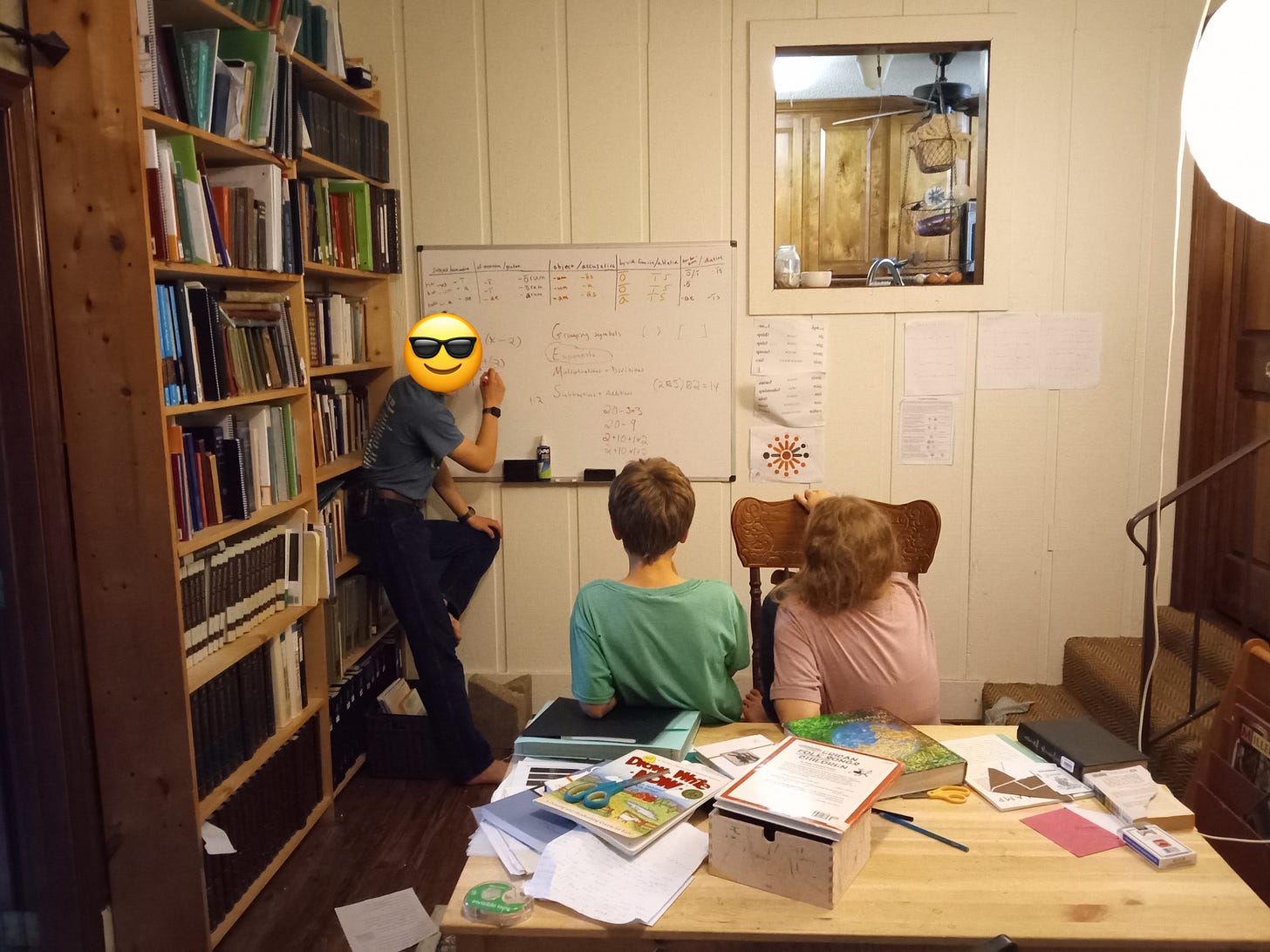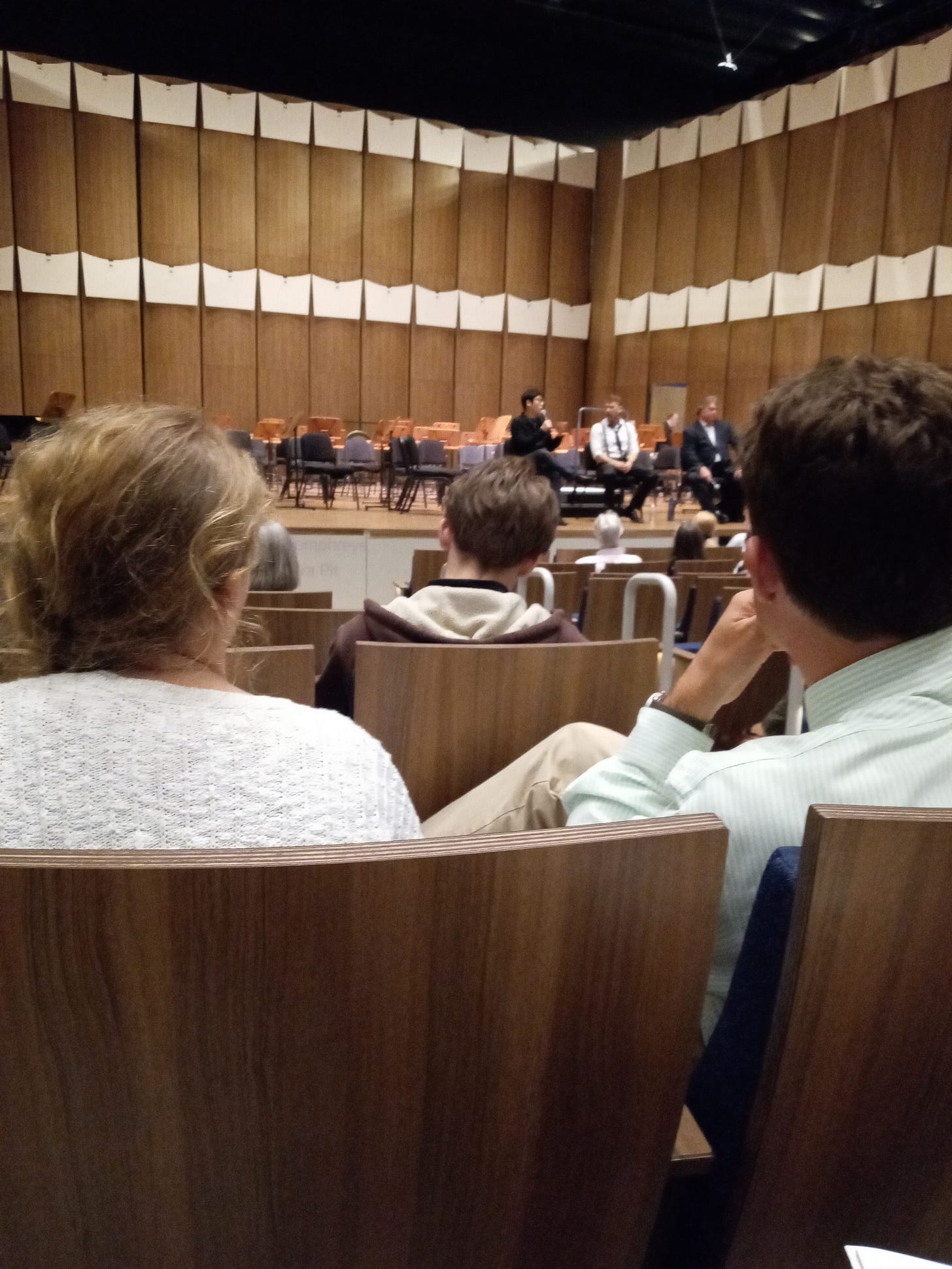For the past many months, all my extra creative energy has gone towards one very special project, which is finally complete.
I’m sure I’ll have lots of time and energy for homeschool blogging now.
Homeschooled High Schoolers MIA
Something Dixie Dillon Lane said recently got me thinking about the question that occurs to all homeschooling mothers sometime around when their oldest turns twelve or thirteen and hits about “seventh grade” - where are all the high schoolers?
That kid who was just two grades ahead of your oldest, the one who’s mom you used to ask for advice on teaching reading or getting math done every day, has vanished from your homeschool group’s park days. Your favorite homeschooling influencer’s oldest child, who’s so pretty delight-directed elementary school days inspired despair at the unaesthetic flat lays your own homeschool produced, has vanished from her feed.
The reasons are all reasonable enough. Some families find school a much better fit for these years. Others stay home but outsource most of their academics, making for boring homeschooling “content” - mom now checks in once a week to make sure teenagers are on track or drops them at co-op or maybe is herself too busying teaching at co-op to document their secondary education journey.
And, of course, there’s the universal sense that our children’s privacy demands we fall silent when they hit adolescence. I sympathize with this sentiment, and yet it leads to the erasure of middle-aged mothers from the homeschooling public square and the near-domination of that square by mothers with, at oldest, middle school aged children. To be fair, their homeschools are all lovely and they are probably better homeschoolers than I, but still, there’s no substitute for the voice of experience. I think there must be a way to talk online about homeschooling high school without trespassing overmuch on our teenagers’ privacy or retreating entirely into generalities.
Not that I’m a voice of experience to be sure. My first is only - and also already! - in 10th grade, and over the past couple of weeks while the Principal has been home on parental leave, I’ve taken the opportunity to unburden myself of all my worries and frustrations with regards to educating our firstborn. Just when you think you’ve got this homeschool thing figured out, suddenly you hit high school and then you also have a baby and whew, things do not seem so figured out any more.
We’ve decided to make three large-ish changes to how we’ve been doing high school, and describing those changes and why we’re making them seems like a great way to get back to writing in this space. But caveat mater - this is just one family’s iterative homeschooling process in pursuit of one family’s possibly quirky goals for secondary education.
Change 1: Accommodating the adolescent circadian rhythm
Getting Benedict up in the morning was ruining our day.
Nobody likes to nag, but the first interaction I found myself having every morning with Benedict was to nag him to get out of bed, nag him to hurry up and get himself going, nag him to be on time to the family morning meeting, which he moodily tolerated from the deepest corner of the couch. Having been a night owl myself until accumulating a certain number of children, I sympathized with the energy he got in the evening, once the house was quiet and dim. He put that energy to productive use on personal projects: writing, reading, working on his invented language. But I wished that late night energy didn't result in his inability to rise pleasantly at a time that worked best for the rest of the family’s daily schedule.
The whole issue came to represent for me one of the big challenges of homeschooling high school: helping a teenager individuate while still remaining a member of the family and - for a few more years - the household. When can you give and let them do their own thing? When do you need them to be a team player and stick with the group still?

The Principal and I hashed out the issue, trying various strategies to help Benedict get going in the morning - some morning exercise, some time outside getting fresh air and sunlight. While both of these have helped us adults to seize the day, neither seemed to improve Benedict's morning mood nor increase his inclination to leap from his bed the moment his alarm went off.
So the Principal started reading about the sleep needs of the average adolescent, which are subject to a developmental change in the daily production of melatonin, the hormone that is supposed to make us sleepy. Melatonin levels rise several hours later in adolescents than in younger children or in adults, leading to late night young adult energy combined with a correspondingly later morning rising time. Now, I've never seen a melatonin, but Benedict’s insistence that he just isn’t tired until late at night and doesn’t go to sleep earlier just because we send him to bed earlier certainly mirrored my younger self’s experience.
We went went back and forth on the issue. The Real World does not operate according to teenagers’ circadian rhythms.1 Shouldn't teenagers get ready for life in the Real World? Didn't we all have to get up at 6am as teenagers ourselves to get to school on time while managing an early morning paper route or attending early morning extracurricular meetings? Wouldn't letting Benedict have a dramatically different rising time from the rest of the family interfere with the daily schedule we need to maintain for the common good? And also leave him not enough time to complete his schoolwork and pursue his other interests?

But despite some hesitations, we've decided to trial a more teenager-friendly sleep schedule for Benedict and, to the extent she wants to follow it, his younger sister, who is only now 13 and still seems inclined to go to bed earlier and rise earlier than her older brother, though not as early as her younger siblings. We've landed a bedtime of 11pm and a rising time of 8am. The later rising time means Benedict will have to shift an hour of his school work into the evening, but he was so enthused about the overall change that he happily agree to that adjustment.
The condition for keeping the schedule is that Benedict adheres to it with no more nagging. If I still find myself every morning getting off to a terrible start with him, because eight o'clock comes and I have to go and harangue him out of bed, then the schedule change will not be accomplishing my goals, and we will revert to bed and rising times that are more convenient for me. So we will see how this goes.
Sexta is stirring so tune in next time for the second exciting installment in High School Adjustments: block scheduling!
Or any other age group’s, for that matter, at least since the adoption of artificial lighting, and it's not clear that adapting to the artificially lit real world has been great for our health and “sleep hygiene.”







I've actually been wrestling with just this question, Sara -- whether or not to allow my eldest to get up later than the rest! I have made basically the same decision as you and your husband have, to let her sleep until a later-than-the-others-but-still-not-noon kind of hour. She does her schoolwork just fine either way so it seems like a good idea to make this compromise.
This is fascinating- and I guess, one of the perks of the flexibilites of homeschooling. I remember being a teen (and into my early twenties) and really feeling awful in the mornings, beyond anything I felt I had reasonable control over. I'm in my 30s now and still not a morning person, but mornings are totally manageable for me now rather than pure torture. There are schools here in England who have trialled a later start time for teens, to great effect.
While reading the post I thought you were going to trial something more like a 1am-10am bedtime/rising time for your son, so 11pm-8am seems very very reasonable! (And still pretty accurate for the "real" world).